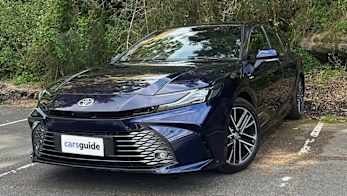The SUV domination of the new car market could bring down some of the most famous names in the business — or redefine them.
Recent reports from Europe suggest Ford is considering reviving the Focus nameplate for a new SUV. Hyundai recently showed off the Concept Three electric hatch but has no plans for a new i30 hatch. Even the iconic Volkswagen Golf is reportedly due for a radical change by the end of the decade.
In short, the hatchback as we have known it for decades is facing a very different future. Sales of small cars have been plummeting in recent years.
Total small car sales (across both mainstream and luxury) are down 23.4 per cent in 2025 and that’s just the tip of the iceberg. Over the past decade small car sales have plummeted by 60 per cent as the number of affordable small cars to choose from have gone from a healthy 32 models in 2015 to just nine currently on offer.
The stalwart Toyota Corolla is still, by some margin, the best-seller in the segment but even it is down more than 25 per cent so far this year. The likes of the i30, Mazda3, Subaru Impreza and Skoda Scala are all getting older and there isn’t a clear replacement strategy for all of them.
Speaking to CarsGuide earlier this year, new Hyundai Australia CEO, Don Romano, made it clear he still sees the hatchback market as important in our country, but the South Korean brand is limited by the i30 hatch now being sourced from Europe.
The current generation i30 hatch is now only available in N and N-Line, and while recent updates will keep it viable for another year or two, there’s no replacement coming, according to Romano. He said the market for hatchback is simply drying up around the world.
“Well, what's interesting [is] I've done a lot of work for New Zealand prior to this,” said Romano, who previously led Hyundai Canada. “I was on the board of directors for Hyundai New Zealand, which is an independent distributor. And reaching out to them, asked them how many i30 hatches could they take? And they said, zero. It's not a seller in New Zealand. There's no demand for it in North America. There's no demand for it in Canada.
“Hatches are just more popular here because I think the conditions are very specific here with small parking places and tight roads where it really makes sense to open that back [hatch] and put your supermarket groceries in or your luggage or whatever it is. You can easily put it in and out. In Canada we go through the side doors, here you need to go through the back, so SUV or if it's a car with a hatch, it serves the same purpose.”
Ford’s decision to reportedly use the Focus nameplate for an SUV is unsurprising, as Ford Europe has already revived the famous Capri badge for an electric SUV. Ford Australia dropped the slow-selling Focus three years ago, but a small SUV would likely be more popular in the current market.
.jpg)
Sales of small cars are down, but small SUVs have enjoyed a 12.3 per cent sales boost in 2025. This is leading more brands to reconsider the value of a hatch amid declining interest.
The challenge for car makers will be to continue offering an affordable entry-level model to introduce new customers to their brand. Small cars have often played that role of being the first ‘new car’ for many and that experience can create a lifelong customer.
This is increasingly being forgotten or an acceptable loss for many brands as they push a more premium line-up for greater profitability.
Small cars simply don’t play a role in that any longer for most brands, so it’s looking increasingly likely that more and more will disappear before the end of the decade — even some famous names.






.jpg)


.jpg)


.jpg)





.jpg)


.jpg)
.jpg)
.jpg)
.jpg)


.jpg)



.jpg)
